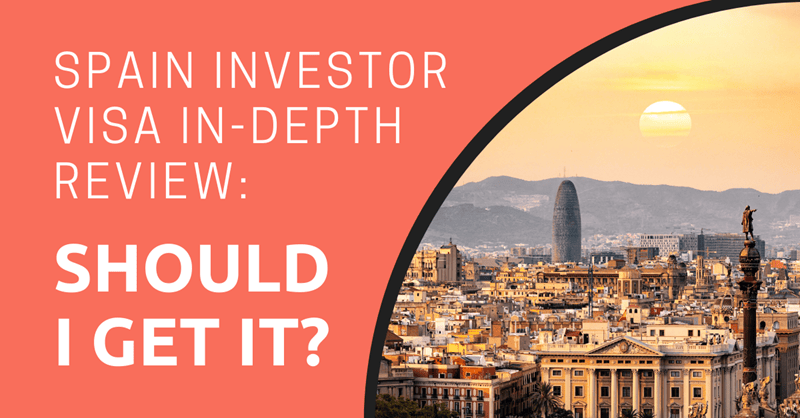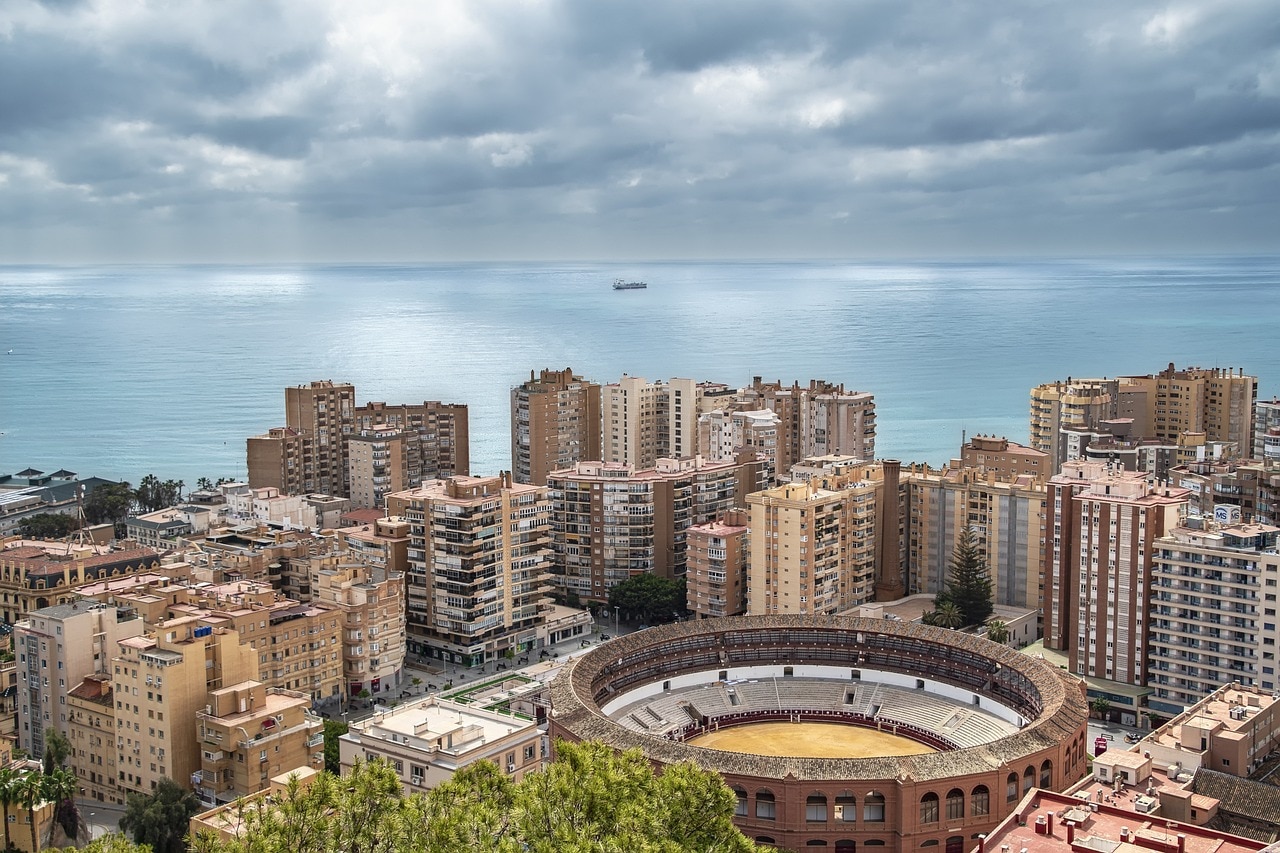
Spain has an investor visa, which is commonly known as a golden visa.
It’s for anyone who wants to get residency in Spain by making a sizable investment.
With this visa, it allows you to stay in Spain for many years. You can also get a permanent residency or Spanish citizenship with it.
The Spanish golden visa is another option available to those who would like to get a European passport or those who want to retire or live in a great country like Spain.
Let’s take a look at our personal review of the Spain Golden Visa, including investment requirements, advantages, related fees, pros, cons, and more. By the end of the review, you will be able to make an informed decision whether the Spain Golden Visa is for you or not.
This article will take approximately 16 minutes to read. Don't have the time right now? No worries. You can email the ad-free version of the article to yourself and read it later!
Disclaimer: This article may include links to products or services offered by ExpatDen’s partners, which give us commissions when you click on them. Although this may influence how they appear in the text, we only recommend solutions that we would use in your situation. Read more in our Advertising Disclosure.
Contents
- Key Takeaways
- Investment Requirements
- Other Requirements
- Application Process
- Where to Start an Application
- How Long Does It Take?
- Can I Apply on My Own?
- Which Family Members Can I Add?
- Advantages
- Disadvantages
- Why Living in Spain?
- Spain Dual Citizenship Rules
- General Taxes in Spain
- Should I Get a Spanish Golden Visa?
Key Takeaways
- The investment minimum for a property is 500,000 EUR. It can be anywhere in Spain.
- The path to citizenship takes ten years. Spain also has some unique rules about who is allowed dual citizenship.
- To maintain the golden visa, you only need to be in Spain once a year. However, you must spend half the year there for permanent residency or citizenship.
- You have to apply for this visa in the country of your citizenship or the country of your residency.
- You can add family members.
- You and your family members can use the Spanish healthcare and education systems with the visa.
Investment Requirements
You have many investment options for getting a Spain Golden Visa.
Real estate is the most common option since it requires the least amount of investment and also has a straightforward process.
The required amount is equal to or greater than five hundred thousand euros (EUR 500,000), taxes excluded.
The investment can be in a single or several properties, provided that the aforementioned total sum of five hundred thousand euros is reached.
Some other alternatives to real estate investment have a much higher investment amount.
Here are a few examples:
- Initial investment equal to or greater than one million euros (EUR 1,000,000) in stocks or shares in Spanish companies undertaking actual business activities.
- Initial investment equal to or greater than one million euros (EUR 1,000,000) in investment funds or venture capital funds established in Spain,
- Investment of one million euros in a business project in Spain that can provide employment and strengthen the socio-economic status of Spain or contribute to technological or scientific innovation.
You can consult the embassy website for more information on the other investment options.
Other Requirements
In addition to the investment requirements, there is other paperwork you need to prepare, including:
- Visa Application form
- Passport size photo
- A valid passport consists of the original and a photocopy of the passport page or pages containing biometric data. The passport must have a minimum validity period of one year and two blank pages.
- Documents accrediting the investment: The original and a copy of the following documents are required:
- Financial means. Original and a copy of the documents proving sufficient own financial means or accrediting a regular source of income for the investor and, where applicable, for the family members accompanying them. The minimum required amount equals 400% of Spain’s Public Multiple Effects Income Indicator (IPREM). To this amount, 100% of the IPREM for each family member must be added. Foreign documents must be legalized or apostilled and, where applicable, submitted with an official translation into Spanish.
- Criminal record check certificate. Applicants of legal age who apply for a visa must submit the original and a copy of the criminal record check certificate(s) issued by their country or countries of residence for the past two years. If you are a citizen of the U.S., this must be an FBI background check. This certificate can be six months old unless it specifies a longer expiration. All background checks need an apostille. They need to be translated into Spanish.
- Health insurance. Original and a copy of the certificate accrediting the public or private health insurance contracted with an insurance entity authorized to operate in Spain.
- Proof of residence in the consular district. The applicant must provide proof of their legal residence in the Spanish embassy or consulate that you are applying to.
The full list of documents you need to have can be found here.
Application Process
The application procedure goes like this:
- You make an appointment and apply at the embassy of your jurisdiction. You have to make an appointment in advance. For example, if it’s in the United States, you need to make an appointment in advance by email. Check the respective embassy in your area to see how to make this appointment.
- Visa application period: 1 year as of the capital investment. This period does not apply to investments in real estate, but investments made before 29 September 2013 will not be eligible.
- You are given proof of receipt: The Consular Office will provide the applicant with proof of receipt of the application with a code that enables them to check the application status through a link. The Consular Office or embassy may ask the applicant to submit any missing documents or provide additional documents or data necessary for a decision regarding the application. The applicant may also be called in for a personal interview.
- Decision period: The legal period for reaching a decision is 10 days from the day after the application submission date, but this period may be extended when an interview or additional documents are requested. The most common mistake is not having the proper paperwork. Often, it is issued with the background check; many people don’t get the apostille, so they have to do it over.
- Collecting the visa: The visa must be collected in person by the applicant or by their representative within a maximum period of one month from when you hear that you are approved. The visa is valid for a year. You don’t need a residence card, but you can apply for one in Spain if you want one.
You can also consult this checklist provided by the Spanish government when making your application.
Where to Start an Application
You must apply at a Spanish consulate or embassy in your home country or country of residence. You cannot apply in a country other than one of those.
For example, if you are legally living in Mexico with a legal resident permit, you can apply at the Spanish embassy in Mexico City.
On the other hand, if you are a nomad, just using your tourist time in Mexico or wherever you are, you can’t apply at that Spanish embassy in Mexico City. Instead, you need to apply from the Spanish embassy where you have your residency status.
Here’s a list of Spanish consulates/embassies in the USA, Canada, and Australia:
How Long Does It Take?
The first visa should be decided in 10 days. However, the time for longer extensions can vary. Generally, as with most of these types of visas, if you have the proper paperwork in order and meet the requirements, it takes less time.
It is one of the golden visas with a faster processing time.
Also, renewing the visa is usually quick if you meet the conditions.
Can I Apply on My Own?
Yes, you can. As long as you are over 18, you can apply on your behalf or seek a representative to apply on your behalf.
The good news is the website is relatively straightforward and comes with a checklist of everything you need for the application.
You can also hire a consultant to review the application or help you invest in Spain. Some companies help with that.

You may also have a legal representative do so on your behalf.
However, there is paperwork for this. You must provide a copy of the representative’s identity document or passport and a power of attorney or document which provides and certifies representation must be submitted.
The representative must provide the original documents when submitting the application on your behalf in the same manner as if you were applying independently.
Which Family Members Can I Add?
- Your spouse or domestic partner (if for over two years)
- Your children under 18 years old
- You can add adult dependent children or parents under various circumstances.
Advantages
There are many advantages to getting the Spanish investor visa.
Let’s take a look.
Live, Work, and Do Business in Spain
With this visa, you can work, do business, and do whatever you want in Spain. A few of these other golden visas don’t always allow people to do as much work and business in the country, but this one does.
Travel Around the Schengen Area
With this visa, you can travel and visit all the countries within the Schengen agreement without hassle. You don’t have to spend time counting your 90/180 days.
Pathway to Getting a European Passport
The visa does offer a pathway to getting a European passport. If you follow everything correctly, you can stay in Spain for the rest of your life.
You can opt for Spanish citizenship after ten years if you stay half a year in Spain. If you become a Spanish citizen, you can live and work anywhere in the E.U. You also don’t need your investment anymore.
However, there are different rules for a minimum stay if you want citizenship in Spain.
However, becoming a permanent resident is also acceptable.
You have many of the same rights as most citizens, and it’s hard to revoke permanent residence if you commit a serious crime or leave Spain for a long time.
No Minimum Stay Requirement
There is no minimum stay required to keep the visa.
Easy Renewal
You just need to keep the investment and not commit a crime. The renewal is easy as long as you maintain the same conditions.
Fast Processing Time
The processing for the Spanish visa is faster than most other golden visas.
Disadvantages
The Spain Golden Visa isn’t perfect. Let’s take a look at the main disadvantages.
Long Path to Citizenship
The path to citizenship and permanent residence is longer than in Portugal and Greece. You also have to take a test to get it. It’s not something you can just get automatically.
Dual Citizenship Rules
Also, there are some unique rules with dual citizenship in Spain; check the section on dual citizenship for more information.
Inconvenient Application Process
Some of the application process is inconvenient.
You have to apply at a specific consulate or embassy, which can be very time-consuming for someone in the United States, Canada, or Australia.
For example, someone living in Atlanta, Georgia, must visit the Miami, Florida, embassy. It’s not that close. You can’t apply at any embassy or consulate you want to.
2-year Extensions
Another complaint is that the extensions are only for two years at a time compared to five years like the others.
While you can apply for permanent residency after five years, but until then, you can only extend it every two years.
Lowest Rates of English Competency
Spain has one of the lowest rates of English competency in Western Europe.
While Spanish is relatively simple for English speakers, dealing with offices or hospitals might be challenging. Also, learning languages is much more challenging if you are a monolingual American or a Canadian in middle age.
Many British expats manage there, but if you want to engage in the local community, it is essential to learn Spanish.
Many Spanish learners have said Spanish in Spain is much more complex and faster than the Spanish spoken in Latin American countries. But this varies by person and their ability to learn languages.
Other
It is a topic of contention with some Spaniards. Some want to do away with the program. Many blame programs like this for the rise in the cost of housing. Some politicians want to get rid of it. It could be discontinued in a few years, so if this is a long-term goal, it might not be possible five years later.
The stability of your investment might not be guaranteed in some situations. You might have to pay more taxes in the future on some of these investments.
If you are a U.S. citizen, you must report your foreign-earned income and assets no matter where you live. If you are eligible for this type of visa and can make this type of investment, you will likely owe money.
Why Living in Spain?
Spain has a large expat community. Many people from all over Europe and the world move there, and it is very easy to find people to meet for social activities. It’s a popular place for British and Northern European people to retire. But it also has a lot of appeal for younger expats and families.
There are many choices and varieties in Spain. Everyone associates Spain with the South and the beaches, but Spain also has a lot of lush greenery in the North. There are so many different types of landscapes. If you want something rural, Spain has it.

If you prefer cities, Spain has some fantastic cities, especially its capital city of Madrid. Different regions also have their own significant cultures. You have Catalans, Basque, and Galicians in the North.
You can find Andalusians in the South. Spain is a little melting pot. It also is a fantastic place to live if you are a “foodie.” Spanish cuisine is one of the most highly regarded in Europe.
You can use public services such as healthcare and education with this visa. Spain has an excellent healthcare system. If you have children, they can attend a Spanish school and learn the language. There are also international school options, but local education is outstanding.
Spain Dual Citizenship Rules
Spain typically only allows dual citizenship for countries with which it has agreements.
Most of these are from Latin American countries and Portugal. The United States, Canada, Australia, and the U.K. are not on the list. Some exceptions exist for those of Sephardic Jewish descent and those with a Spanish spouse.
However, there are some reports of expats from countries not on the list who have obtained Spanish citizenship but have yet to renounce their former nationality. It might not be strictly enforced.
However, on paper, it is not allowed for U.S. or U.K. citizens to retain their former nationality if they apply for Spanish. If this is a concern, look into some discussions about it and find out the loopholes.
For example, one loophole is that if you hold a U.S. and Mexican passport, you can usually apply for Spanish citizenship based on your Mexican passport, and they won’t insist on you revoking your U.S. passport.
Also, if you are from Singapore, Hong Kong, or many other Asian nations, you are usually not allowed to be a dual citizen.
It’s possible to renounce U.S. citizenship as well. Many U.S. citizens have done this primarily over taxes. However, it comes with a hefty fee, and you still have to pay whatever taxes you owe. You also are not off the hook for your financial obligations or legal obligations in the US, such as debt or child support.
General Taxes in Spain
The tax rates for the golden visa in Spain vary depending on your plan.
Up front, there are no general taxes for golden visa holders. Generally, you can pay less tax if you are in the country for less than half of the year.
Taxes can also depend on whether you use your property for rentals and the type of investments you make. Depending on where you live, there is a property tax between 0.5 and 1.5 percent. If you rent it out, the tax is about 19% if you are not a tax resident in Spain.
The taxes for interest generated from investments vary between 25% and 28%.
If you work and do business in Spain, the tax rates for residents vary between 19 and 47 percent. There is also a wealth tax and inheritance tax based on net worth.
For more information on Spanish taxes, consulting an agency specializing in them is the best way to go forward.
Should I Get a Spanish Golden Visa?
In our opinion, the Spain Golden Visa is mainly for those who are interested in living in Spain for a long time and plan to make an actual investment.
Unlike other golden visa programs, it has strict requirements when it comes to getting dual citizenship. And you also need to live here for at least 10 years.
So, if you are looking for a quick way to get a European passport, you better look at another program. If that’s the case, Malta should be more suitable.







